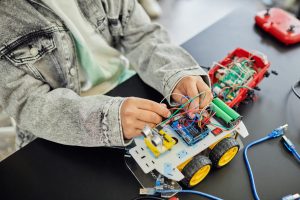Helping Students Develop Resilience Through Academic Challenges
Academic challenges are an inevitable part of a student’s educational journey. From rigorous coursework to challenging exams, students are constantly faced with obstacles that require resilience and determination to overcome. While academic achievement is a crucial aspect of a student’s success, the ability to bounce back from setbacks and adapt to difficulties is equally important. In fact, studies have shown that developing resilience in students can lead to improved academic and personal growth, making it a valuable skill to cultivate. In this article, we will explore the concept of resilience and how educators can help students develop this crucial quality through academic challenges.
The Importance of Resilience in Academic Challenges
Resilience is the ability to overcome adversity and bounce back to a state of well-being. In the context of academic challenges, it refers to a student’s ability to cope with setbacks, failures, and stress, and continue to strive for success. As students progress through their education, facing academic challenges becomes increasingly common. While these challenges can be demanding and overwhelming, they also provide an opportunity for students to develop resilience, a skill that is essential for success in both academics and life.
Resilience allows students to maintain a positive attitude and outlook despite academic challenges. It enables them to view failures as learning opportunities, rather than insurmountable roadblocks. When students have the ability to persevere in the face of obstacles, they develop self-confidence and a sense of agency, which are crucial for academic success.
Ways to Help Students Develop Resilience
Teach Coping Strategies and Self-Care
One effective way to help students develop resilience is to teach them healthy coping strategies and the importance of self-care. Encourage students to take breaks when needed, engage in activities they enjoy, and practice self-care routines like exercise, meditation, or journaling. By incorporating these practices into their daily routine, students can learn to manage stress and maintain a positive mindset even in the face of academic challenges.
Additionally, teaching students how to self-regulate their emotions can help them develop resilience. This involves recognizing and managing negative emotions, such as frustration or anxiety, in a healthy way. By teaching students these skills, educators can empower them to take control of their emotional well-being and respond to challenges in a more resilient manner.
Promote a Growth Mindset
A growth mindset is the belief that intelligence and skill can be developed and improved through effort, practice, and determination. In contrast, a fixed mindset is the belief that intelligence and abilities are fixed traits that cannot be changed. Students with a growth mindset are more likely to view challenges as opportunities for growth and are more resilient in the face of setbacks.
Educators can promote a growth mindset in their students by praising effort, emphasizing progress over perfection, and providing opportunities for reflection and self-improvement. By encouraging students to adopt a growth mindset, educators can help students develop resilience and a positive attitude towards academic challenges.
Encourage a Supportive Community
Building a supportive community for students is a crucial aspect of developing resilience. A strong support system can provide students with a sense of belonging and a safe space to share their challenges and discuss various coping strategies. Educators can create such a community by fostering a positive and inclusive classroom environment, where students feel comfortable reaching out for support when needed.
Additionally, educators can also involve parents and guardians in the process of developing resilience in students. By working together, students can receive consistent support and encouragement both at school and at home, which can significantly enhance their resilience and overall well-being.
Conclusion
Academic challenges can be daunting, but with the right support and mindset, students can develop resilience and thrive in the face of difficulties. As educators, we have the responsibility to not only teach academic concepts but also equip students with crucial life skills, such as resilience. By implementing the strategies mentioned in this article, we can help students develop resilience and set them up for success in both academics and life.










